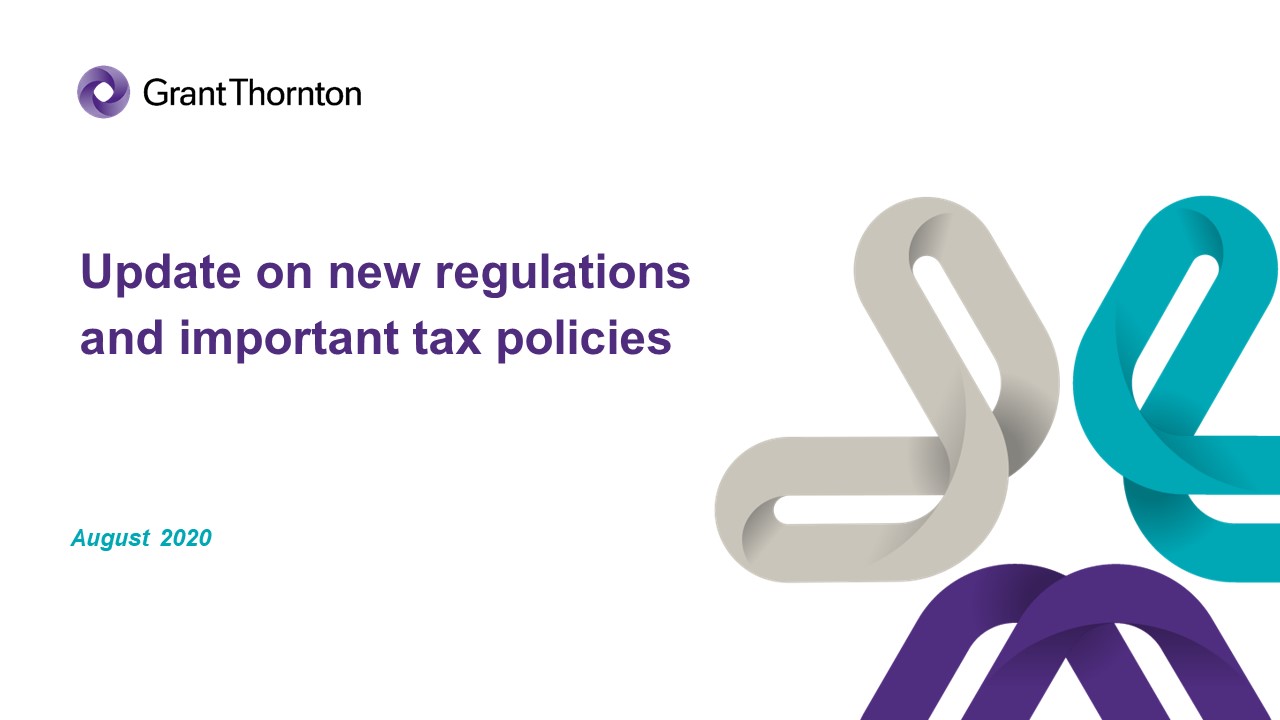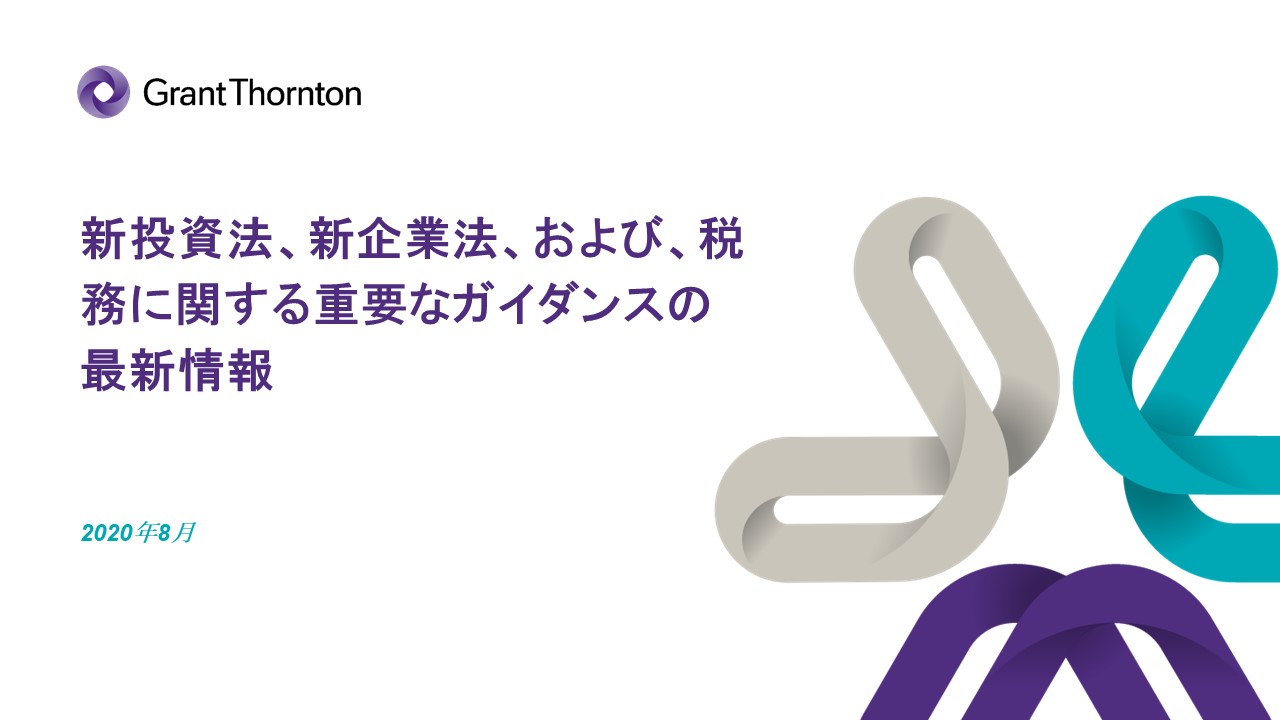-
International Financial Reporting Advisory Services
IFRS reporting advisory serivces of Grant Thornton are carried out by our dedicated team with expertise in IFRS implementation.
-
Audit Services
• Statutory audit • Review of financial statements and financial information • Agreed-upon procedures • FRAS services • Compilation of financial information • Reporting accountant • Cross-border audit • US GAAP audit
-
Audit Quality
We have various methods of monitoring our system of quality control and engagement quality, including real-time involvement of coaches and national office personnel on select audit engagements, reviews of issuer audit engagements prior to archiving by someone outside of the engagement team, and internal inspections of assurance engagements and the system of quality control.
-
Audit Approach
Audit Approach
-
Licensing services
Licensing services
-
International tax planning
Our extensive international network provides us with significant resources to meet all your expansion goals. We strive to develop commercially focused and tailored tax strategies to minimise tax exposures and maximise business efficiency.
-
Expatriate tax planning
We have a broad knowledge base and skills to assist you keep your personal income taxes to a legitimate and reasonable level, while remaining compliant with legislation. We can develop a personalised package for each key employee to take maximum advantage of the exemptions and incentives available.
-
Tax advisory
We will review the proposed business model and transactions and advise on tax implications and recommendations to optimize the tax opportunities under the local regulations and treaties which Vietnam entered into. Furthermore, we coordinate with our GT global tax team to provide a comprehensive tax advisory for the countries involved in the business model and transactions.
-
Tax compliance services
This service is designed to assist enterprises to cope with the statutory tax declaration requirements in line with the Vietnamese tax laws as well as the frequent changes and updates in tax laws.
-
Tax health check
Our Tax Health Check involves a high-level review of specific tax areas to highlight the key issues that need to be rectified in order to reduce tax risks. Through our extensive experience, we have identified key risk areas in which many enterprises are not fully compliant or often overlook potential tax planning opportunities. Our tax health check service represents a cost-effective method to proactively manage risks and reduce potential issues arising as a result of a tax inspection.
-
Transfer Pricing
Transfer pricing is a pervasive tax issue among multinational companies. In Vietnam, the tax authorities require special documentation to report related party transactions. Compliance with transfer pricing regulations is an important aspect of doing business effectively in Vietnam as failure to do so may result in significant penalties.
-
Tax due diligence
We conduct tax due diligence reviews of target companies to analyse their tax exposure and position in relation to acquisitions, mergers or consolidations. We are able to integrate this service with our Advisory Services department in order to offer a comprehensive, holistic due diligence review.
-
Customs and international trade
Our experienced professionals can help you manage customs issues more effectively through valuation planning and making use of available free trade agreements. We also assist Clients in optimising their customs procedures by making use of potential duty exemptions and efficient import-export structures. Risk mitigation activities include customs audit defense and compliance reviews.
-
M&A Transaction
We advise numerous foreign investors on efficient tax structures for their investments. Our experience allows you to consider all the options and set up a corporate structure that meets both operational and tax efficiency requirements. In short, the structure that is best for you.
-
Industrial Zones – Picking A Location For Your Business
Grant Thornton Vietnam’s one-stop services are designed to provide comprehensive support to both new and current investors who are planning to expand or restructure their business in Vietnam. Our professionals have established strong working relationships with landlords, property developers and authorities at various localities. With extensive experiences in liaison with the relevant agencies, we offer assistance including negotiation on land rental rates and efficient management of licensing process. Our customized and flexible solutions can bring benefits of cost efficient location, accelerate licensing process, and optimize tax opportunities while remaining in compliance with legislation.
-
Tax Audit Support
Tax audit support services provide comprehensive assistance to your business in Vietnam. Recent tax practices have shown the general tendency of launching routine tax audit on yearly basis. Tax authorities have been effectively using more sophisticated methods to identify target entities from across different industry sectors.
-
Business Risk Services
Business Risk Services
-
Transaction Advisory Services
Transaction Advisory Services
-
Valuation
Valuation
-
Business consulting services
Finance Management Advisory
-
Accounting services
Accounting services
-
Taxes compliance within outsourcing
Taxes compliance within outsourcing
-
Payroll, personal income tax and labor compliance
Payroll, personal income tax and labor compliance
-
Secondments/Loan staff services
Secondments/Loan staff services
-
Compilation of the financial and non-financial information
Compilation of the financial and non-financial information
-
Accounting systems review and improvement
Accounting systems review and improvement
-
Initial setting-up for accounting and taxes systems
Initial setting-up for accounting and taxes systems
-
Management accounting and analysis
Management accounting and analysis
-
Comprehensive ERP system solution
ERP software is a tool for business operations, production management, order processing and inventory in the business process. Today, ERP software for small and medium businesses has been greatly improved to help businesses manage their business better. The article below will answer all relevant information about what ERP software is and offer the most suitable ERP solution for businesses. Let's follow along!
-
Analyze Business Administration data
We believe in the value that data can bring to the success and development of every business. Our team helps design data architecture supported by tools, to support business governance and provide useful information to management.
-
Financial reporting compliance solution package
Putting financial issues at the heart, this service helps ensure that financial reports for customers comply with both the requirements of Vietnamese accounting regulations and standards (VAS) as well as reporting standards. international finance (IFRS).
-
Third-party ERP extensions
ERP is a long-term solution that requires long-term travel, not short-term. We understand that many businesses cannot deploy the entire ERP system at once due to many different reasons, instead businesses can deploy each part. Over time, these solutions can be expanded to accommodate improved business processes or can even link completely new processes across different departments.
-
Localize, deploy and rebuild the project
Quite a few ERP projects need to be implemented according to current Vietnamese requirements and regulations, but still comply with common international business requirements. These projects need some improvements and adjustments in the right direction.
-
Consulting on technology solutions
We support the selection and implementation of the most suitable solutions, ensuring business efficiency and performance. We will work closely with customers to plan, evaluate and implement the right technology investment strategies and solutions to meet the development needs of businesses.

-
Offshore company establishment service
Using the offshore company model will facilitate the owner in the process of transaction and expand overseas markets, take advantage of the tax policy with many incentives and protect the value of the family enterprise's assets.
-
Private Trust Advisory
The development of the economy with many modern financial instruments has brought many advantages and opportunities for the enterprises, but there are still certain potential risks in any type of business. So how to protect your asset value with an appropriate company structure while stay compliance with relevant regulations?
-
Our values
We have six CLEARR values that underpin our culture and are embedded in everything we do.
-
Learning & development
At Grant Thornton we believe learning and development opportunities help to unlock your potential for growth, allowing you to be at your best every day. And when you are at your best, we are the best at serving our clients
-
Global talent mobility
One of the biggest attractions of a career with Grant Thornton is the opportunity to work on cross-border projects all over the world.
-
Diversity
Diversity helps us meet the demands of a changing world. We value the fact that our people come from all walks of life and that this diversity of experience and perspective makes our organisation stronger as a result.
-
Contact us
Contact us
-
Available positions
Experienced hires
-
Available positions
Available positions
Vietnam is implementing a series of important changes in terms of policies to alleviate post-COVID-19 difficulties as well as enhance the business environment, unfold social power to attract and take advantage of available opportunities when major markets in the world are gradually reopening and expanding their supply chains to minimize risks and disruptions.
In this month Tax Newsletter, Grant Thornton Vietnam would like to update several recently issued legal policies.
1. Resolution No.116/2020/QH14 on reducing 30% of CIT payable in 2020
Resolution 116/2020/QH14 ("Resolution 116”) was approved by the National Assembly on 19 June 2020 on the reduction of the CIT payable of 2020 for enterprises, households, service agencies and other organizations established as prescribed in the Vietnam law specifically as follows:
- Reduce 30% of the amount of CIT payable of 2020 for enterprises whose total revenue in 2020 does not exceed VND 200 billion.
- Enterprises determine by themselves the reduced tax amount for temporary quarterly CIT payments and CIT finalization of 2020.
The Resolution takes effect 45 days after the date of signing and applies only to the tax period of 2020. The Government is in the process of drafting and seeking opinion contributions on the Decree regulating the implementation of the Resolution 116. We will update as soon as there is new available information on this issue.
2. Law on Investment 2020 No. 61/2020/QH14
The Law on Investment No. 61/2020/QH14 (Law on Investment 2020), which was issued by the 14th National Assembly on 17 June 2020 replacing the Law on Investment 2014, will take effects on 1 January 2021. Several notable contents of the new Law on Investment are as follows:
- Adding "debt collection agency business" to the list of banned business investment lines.
- Reducing a number of conditional business lines such as Franchising, Logistics, Shipping agency services, etc.
- Adding some conditional business lines such as Clean water business (daily-life water); Architectural services business, etc.
- Amending business lines eligible for investment incentives, conditions for implementing investment projects in order to increase investment attraction such as Higher Education, projects with investment capital of over VND6,000 billion, innovative start-up projects, investment projects in the distribution chain for products of small and medium-sized enterprises, etc.
- Adding the regulations on valuation of investment capital value, machinery, equipment and technological lines in several necessary cases to determine tax bases, contributing to restriction of transfer pricing, tax evasion and raising the quality of investment projects in Vietnam.
- Adding regulations on termination of investment projects such as in case the land of investors is withdrawn due to being unused, delayed use; investors carry out investment activities on the basis of artificial transactions; etc. in order to improve the legal basis for the authorities to handle the suspended projects issue completely.
3. Law on Enterprise 2020 No. 59/2020/QH14
Law on Enterprise No. 59/2020/QH14 (Law on Enterprise 2020) issued on 17 June 2020 replacing the Law on Enterprise 2014 No. 68/2014/QH13, with effective from 1 January 2021. Several notable adjustments in the Law on Enterprise 2020 are as follows:
- Eliminating the procedure of notifying the seal design to the business registration authority. Amending regulation that businesses can use the seal in the form of digital signatures in accordance with regulations on electronic transactions.
- Expanding the definition of state-owned enterprises which includes enterprises with more than 50% of charter capital owned by the State, and the total number of shares with voting rights instead of 100% of the charter capital as prescribed in the Law on Enterprise 2014.
- Amending provisions on Non-Voting Depository Receipts.
- Reducing timeline that requires enterprises to notify in writing to the business registration authority to at least 3 working days before the date of business suspension or resumption before the notified date.
4. Circular No.13/2020/TT-BTTTT on the identification of software product production
On 3 July 2020, the Ministry of Information and Communications issued Circular No.13/2020/TT-BTTTT ("Circular 13") replacing Circular No. 16/2014/TT-BTTTT ("Circular 16") to provide guidance on identification of software production, with effective from 19 August 2020 with several notable contents as follows:
- Circular 13 clarifies several contents including:
- Scope of amendment: identifying software production that meets the requirements for enjoying CIT incentives purpose.
- Subjects of application: organizations and enterprises involved in the production of software products on the List of software products as prescribed by the Ministry of Information and Communications.
- Although Circular 13 maintains 7 software production processes as prescribed in Circular 16, however, in the description, Circular 13 clarifies the specific details of each task in each process.
- In addition, in comparison with the contents specified at Points a, b and c, Clause 2, Article 6 of the previous Circular 16, the provisions on determination of software production is prescribed in simpler manner in the Circular 13.
Specifically, the activity of producing a software product by an organization or an enterprise is defined as a software production that satisfies the requirements when the organization or the enterprise performs at least one of two stages: Determination of requirements or Analysis and design. At the same time, the software production should be expressed by one or several documents as prescribed in this Circular, corresponding to each task of the stages performed by the enterprise.
- Software production that have been determined to satisfy the requirements prescribed before the effective date of this Circular will still be considered as meeting the requirements of software production until the expiry of the approved investment projects.
5. Official Letter No. 2835/TCT-TTKT guiding several contents of Decree No. 68/2020/ND-CP on interest expenses of enterprises having related-party transactions
On 14 July 2020, the General Department of Taxation issued Official Letter No. 2835/TCT-TTKT guiding several contents of Decree No.68/2020/ND-CP on related-party transactions as follows:
For the 2019 tax finalization
- For enterprises that have declared their tax finalization in 2019 with deadline before 31 March 2020, enterprises shall supplement CIT finalization declaration in accordance with Decree 68.
- Enterprises that have not yet completed the 2019 tax finalization will implement in accordance with Decree 68.
For retroactive application for the tax period 2017 and 2018
- Retrospective application of controlled interest expenses under Clause 3, Article 8 of Decree 20 for 2017 and 2018 applies only to the following regulations:
- Cap of deductible interest expense: increase from 20% to 30%; and
- Formula of net interest expense: loan interest minus (-) deposit interest, lending interest
- No retrospective application with respect to the amended provisions at Point (b) (carry forward expenses) and (c) (expansion of the subjects of application) in Decree 68 for 2017 and 2018.
6. Official Letter No. 2014/TCT-DNNCN of General Department of Taxation responding to EUROCHAM on PIT for visa and temporary residence card application expense for employees
On 18 May 2020, the General Department of Taxation issued Official Letter No. 2014/TCT-DNNCN to answer the European Chamber of Commerce in Vietnam (EUROCHAM) on the PIT policy for the costs of obtaining temporary residence cards and visas for employees:
- In case employers pay the expenses for applying and extending temporary residence cards and visas for foreign workers in order for them to be eligible to work at organizations in Vietnam and this is the responsibility of employers, these expenses are not included in the taxable income from salaries and wages of the employees.
- In case the visa application fee for employees working in organizations in Vietnam to go on oversea business trips as required by the work is per diem in accordance with the organization financial regulations or internal regulations, it shall not be included in PIT taxable income. The expenses in excess of the prescribed threshold shall be taken into taxable income for PIT calculation purpose.
- In case the expenses for temporary residence cards, visas application paid by the employers on behalf of the foreign workers are the employee's benefits, these expenses shall be included in the taxable income from salaries and wages of the foreign employees.
Therefore, in this Official Letter, General Department of Taxation has clarified further the PIT treatment on expenses for temporary residence cards and visas application for foreign workers paid by the company on behalf of employees compared to several previous guidance (as in Official Letter No. 3867/TCT-TNCN on 25 August 2017 issued by the General Department of Taxation).
7. Official Letter No. 3552/CT-TTHT on PIT of income from gifts of employees
On 8 April 2020, Ho Chi Minh City Tax Department issued the Official Letter No. 3552/CT-TTHT to answer about PIT regulations. Accordingly, in case an individual who is an employee receives gifts in kind from the Company, in form of a lucky draw, or gift vouchers, then this payment is considered as the employee’s benefit and shall be included in the taxable personal income from salaries and wages of the employee.
However, please note that several local tax authorities might have different points of view in this regard according to which an individual who is an employee of the company receiving gifts in kind from the Company which is not taxable incomes from gifts as prescribed in Clause 10, Article 2 of Circular No. 111/2013/TT-BTC and may not be required to declare and pay PIT on these gifts.
Therefore, businesses should pay attention and discuss directly with the tax authority about this issue before implementation to mitigate tax risks.
Please contact the Grant Thornton consultants in case you need more professional advice regarding to the application of tax, accounting, transfer pricing, labor policies, investment and customs as well as other legal policy problems in the business process of enterprises.













